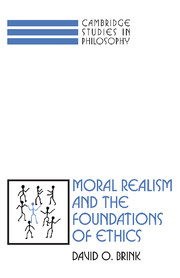Book contents
- Frontmatter
- Contents
- Preface
- 1 INTRODUCTION
- 2 MORAL REALISM AND MORAL INQUIRY
- 3 EXTERNALIST MORAL REALISM
- 4 DOES MORAL REALISM MATTER?
- 5 A COHERENTIST MORAL EPISTEMOLOGY
- 6 MORAL REALISM AND THE IS/OUGHT THESIS
- 7 A POSTERIORI OBJECTIONS TO MORAL REALISM
- 8 OBJECTIVE UTILITARIANISM
- Appendix 1 Must an infinite regress of justification be vicious?
- Appendix 2 Coherence, internalism, and externalism in epistemology
- Appendix 3 The is/ought thesis and intuitionism
- Appendix 4 Rawlsian constructivism
- Bibliography
- Index
Appendix 2 - Coherence, internalism, and externalism in epistemology
Published online by Cambridge University Press: 11 January 2010
- Frontmatter
- Contents
- Preface
- 1 INTRODUCTION
- 2 MORAL REALISM AND MORAL INQUIRY
- 3 EXTERNALIST MORAL REALISM
- 4 DOES MORAL REALISM MATTER?
- 5 A COHERENTIST MORAL EPISTEMOLOGY
- 6 MORAL REALISM AND THE IS/OUGHT THESIS
- 7 A POSTERIORI OBJECTIONS TO MORAL REALISM
- 8 OBJECTIVE UTILITARIANISM
- Appendix 1 Must an infinite regress of justification be vicious?
- Appendix 2 Coherence, internalism, and externalism in epistemology
- Appendix 3 The is/ought thesis and intuitionism
- Appendix 4 Rawlsian constructivism
- Bibliography
- Index
Summary
Chapter 5 defends a coherence theory of justification. I should explain, even if I cannot defend here, how this defense of coherentism bears on the debates between internalism and externalism in epistemology.
We should distinguish between internalism and externalism about both knowledge and justification. Internalism about knowledge construes knowledge as requiring justified belief. The traditional analysis of knowledge as justified true belief, for example, represents internalism about knowledge. Internalism about justification makes justification a function of properties of a cognizer's beliefs that are internal or accessible to the cognizer himself. Versions of foundationalism that base justification on foundational beliefs that are indubitable, for example, represent internalism about justification. Externalism about justification, by contrast, makes justification a natural (e.g., causal) relation between a cognizer's beliefs and the world (see, e.g., Goldman, 1979). A justified cognizer, on this view, need not believe or be aware that this relation obtains. Externalism about knowledge, however, rejects justified belief as a requirement for knowledge; it makes knowledge itself consist in some natural (e.g., causal) relation between a cognizer's beliefs and the world (e.g., Goldman 1967, 1976; Armstrong 1973: pt. 3; Nozick 1981: chap. 3).
AGAINST EXTERNALISM ABOUT JUSTIFICATION
The failure of foundationalism – in particular, of objective foundationalism (5.5) – explains what is wrong with externalist accounts of justification. Justification cannot be, as the externalist claims, the causal reliability of a cognizer's beliefs or any other such natural relation between a cognizer's beliefs and the world, for this would allow justification to be inaccessible to the cognizer herself.
- Type
- Chapter
- Information
- Moral Realism and the Foundations of Ethics , pp. 296 - 300Publisher: Cambridge University PressPrint publication year: 1989



